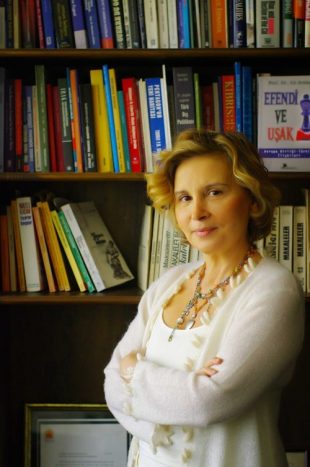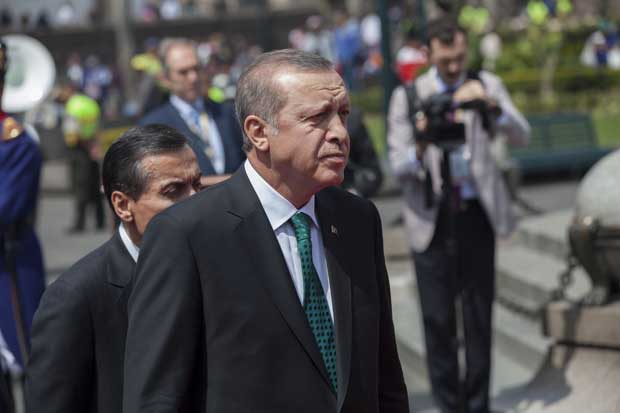
Nazlı Ilıcak
A “ping” woke me in early hours of Monday morning. It was a message from a colleague reading: “Signs of a crackdown. Arrest warrant for Nazlı Ilıcak is issued, she is being searched.”
This was the witch hunt that many critical journalists who belong to the shrinking independent media dreaded for days.
Ilıcak is a 72-year-old veteran journalist. A fiercely defiant figure who belongs to the centre-right and liberal flank of the media, she had just lost her column in the liberal daily, Özgür Düşünce, which was forced to close last week under immense legal and financial pressure.
I rushed out of bed to contact lawyers pursuing the cases, like the one about Orhan Kemal Cengiz, an internationally respected columnist, lawyer and human rights activist, who was conditionally released on Sunday with a ban on travelling abroad.
Soon we had been informed about a list of 42 journalists who have all been targeted with arrest orders on the basis of being part of the “media leg of terrorist organisation FETO” and by implication part of the Gülen Movement.
Reminiscent of Thomas Hobbes’s aphorism, “homo homini lupus” (“man is wolf to man”), some well-placed journalists were busy – like a certain popular columnist with Hürriyet daily – joining the chorus in support for their arrest.
The manhunt was unleashed early and at the time of writing, at least 19 of them were either seized or had surrendered. Ilıcak’s whereabouts were unknown. Eleven of the journalists on the list are believed to be abroad.
The list is a curious one. For us veteran journalists it contains a blend of good colleagues and bold reporters, who were busy breaking story after story on corruption, abuses of power and the deterioration of Turkey’s democratic order.
Büşra Erdal, who wrote for the now-closed Zaman Daily, was one of the best reporters covering the judiciary and court cases; Cihan Acar was known for relentlessly scrutinising stories in the now shuttered Bugün daily and later in Özgür Düşünce. They were long targeted as Gülen sympathisers but what mattered for journalism was their contribution to it.
Another, Bülent Mumay, was recently fired from Hürriyet. Staunchly secular, he ran the internet edition of the large daily, and it was his endless questioning of the government via Twitter that, he says, led to his unemployment. Perhaps not so surprisingly, he was quick to post a photo of his press card on Facebook, issued by Turkish Journalists’ Association (TGC), saying: “This is the only organisation I belong to. I know of no other; I know of no other profession. I shall now go the prosecutor’s office to tell this.”
Another one was Fatih Yağmur, a brilliant young reporter who was the first to break the story in March 2014 of the Turkish Secret Service lorries that allegedly carried weaponry to Syrian jihadists months before daily the Cumhuriyet, whose editor Can Dündar was sentenced to five years and ten months in prison.
Yağmur was soon after fired from Radikal daily, a part of Doğan Media Group, without any specific explanation.
The Platform for Independent Journalism (P24), of which I am a co-founder, has awarded Yağmur with the European Union Investigative Journalism Award last year. He was proud to be recognised after the humiliation of being left unemployed for doing his job properly.
Soon after the manhunt began, Fatih tweeted: “I hear that arrest order was issued on me. It was obviously not enough to punish me with unemployment. I am now shutting down my telephone etc. I shall not surrender until the Emergency Rule is over.”
We also found out that Ercan Gün, news editor of Rupert Murdoch-owned Fox TV, was on the list. His friends said he was on his way to Istanbul to surrender. Gün tweeted: “I trust the law, even if under Emergency Rule.”
With the traffic of those hunted, it was apparent that they believed a certain motive behind the arrests. Ufuk Şanlı, who had earlier worked with Zaman and after (the now a staunch pro-AKP daily) Sabah, tweeted: “I understand that the arrests were issued about journalists who covered and commented about the graft probes (about Erdoğan and the AKP top echelons) in 17-25 December. Thus, my name too.”
He added: “I’ve been a journalist for 15 years, and unemployed for 10 months. I want everybody to know that I have not been in anything but journalism all this time. I believe in democracy, and please pay attention to anything else [said].”
Indeed, the curious mix about the list is telling: instead of a core of columnists, keen reporters, which is the backbone of journalism, stand out. So, informing part of our profession is automatically dealt another severe blow.
This is now the time to raise the SOS flag to all our good colleagues in democratic countries. Unless given clearly articulated assurances about media freedom, the ongoing crackdown will remain a fact. The entire journalist community and international organisations should be acting with a maximum focus on the developments.
All the independent journalists of Turkey who fear the worst, I’m afraid, are justified to do so.
The 42 journalists targetted with arrest orders are: Abdullah Abdulkadiroğlu, Abdullah Kılıç, Ahmet Dönmez, Ali Akkuş, Arda Akın, Nazlı Ilıcak, Bayram Kaya, Bilal Şahin, Bülent Ceyhan, Bülent Mumay, Bünyamin Köseli, Cemal Azmi Kalyoncu, Cevheri Güven, Cihan Acar, Cuma Ulus, Emre Soncan, Ercan Gün, Erkan Akkuş, Ertuğrul Erbaş, Fatih Akalan, Fatih Yağmur, Habib Güler, Hanım Büşra Erdal, Haşim Söylemez, Hüseyin Aydın, İbrahim Balta, Kamil Maman, Kerim Gün, Levent Kenes, Mahmut Hazar, Mehmet Gündem, Metin Yıkar, Muhammet Fatih Uğur, Mustafa Erkan Acar, Mürsel Genç, Selahattin Sevi, Seyit Kılıç, Turan Görüryılmaz, Ufuk Şanlı, Ufuk Emin Köroğlu, Yakup Sağlam, Yakup Çetin.
But it was not just the press that have reason to fear the aftermath of the coup.
The number of arrests nationawide has approached 15,000 while 70,000 people have been purged within the state apparatus and academia. According to Erdogan’s statement late Saturday night, out of 125 generals arrested, 119 have been detained. The number of lower ranked officers and soldiers rounded up stands at 8,363.
Out of the 2,101 judges and prosecutors arrested, 1,559 are in detention as well as 1,485 police officers and 52 top local governors. Fifteen universities, 35 hospitals, 104 foundations, 1,125 NGOs and 19 trade unions have been shut down, based on the allegations that they all belong to a “parallel structure”, namely the Gülen Movement.
The largest union of judges and prosecutors, YARSAV, whose inclination is left and secular, has been shut down indefinitely. The country’s largest charity group, Kimse Yok Mu, which has a vast network of hospitals and orphanages across Africa and Asia, has also been closed.
All this official data speaks for itself, exposing the magnitude of the “counter wave”.
It raises huge questions for any decent journalist. We would be led to believe that Turkey’s arrested generals – a third of the country’s 347 – are Gülenists. But this doesn’t look at all convincing among political circles in the US capital, according to Hürriyet’s Washington correspondent Tolga Tanış.
What’s perhaps more worrisome is that given the coup attempt, the arrests and the incredible implosion, Turkey’s defence system is in huge crisis, leaving the country very vulnerable to hostile activity, in particular by IS units.
Then, of course, there is the widespread confusion over key institutions such as schools and hospitals being shut down. There is no clarity about the fate of the students and patients.
The emergency rule has sent chills deep into the intellectual and traditionally dissenting elite of Turkey. So far, there has been absolutely no assurance from Erdogan or prime minister Binali Yıldırım that the freedom and rights of those in the media, academia, civil society organisations and political opposition groups will be respected.
On the contrary, an arrest order was issued for 19 local journalists in Ankara. A young reporter with ETHA news agency, Ezgi Özer, was arrested in Dersim province. The rector of Dicle University in Diyarbakır, Ayşegül Jale Saraç was detained as well.
Not so surprisingly, then, there is a widespread mistrust and fear spreading now into the intellectual community in Turkey about what they see as an indiscriminate crackdown.
As my colleague Can Dündar put it in the Guardian on Friday: “‘Fine, we are rid of a military coup, but who is to shelter us from a police state? Fine, we sent the military back to their barracks, but how are we to save a politics lodged in the mosques?”
“And the question goes to a Europe preoccupied with its own troubles: will you turn a blind eye yet again and co-operate because ‘Erdogan holds the keys to the refugees’? Or will you be ashamed of the outcome of your support, and stand with modern Turkey?” Dündar added.
I agree with him and let me add a key point: if this oppressive trend continues with full force members of the media, academia, and civil society, as well as the young and secular who feel victimised and desperate due to the vicious cultural struggle that has been going on for years, will have no choice but emigrate. Europe and the West should brace themselves for this scenario.
Turkey is cracking under its incurable divisions.
A version of this article was originally posted to Suddeutsche Zeitung. It is published here with permission of the author.






